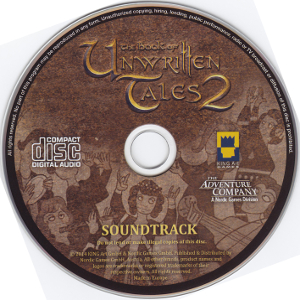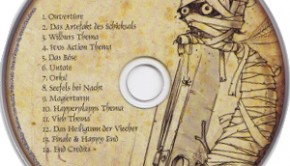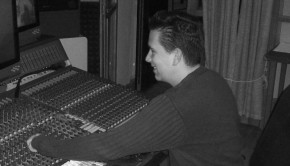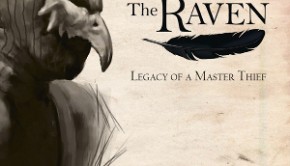The Book of Unwritten Tales 2 Soundtrack
 |
Album Title: The Book of Unwritten Tales 2 Soundtrack |
| Record Label: KING Art |
|
| Catalog No.: N/A |
|
| Release Date: February 20, 2015 |
|
| Purchase: Buy Used Copy |
Overview
If one needed proof that point and click adventures are still popular amongst gamers, The Book of Unwritten Tales 2‘s successful Kickstarter would do the job just fine. Reaching several stretch goals allowed developer KING Art Games to produce a lavish sequel to the well-received first game in the series, boasting impressive production values. Among these were orchestral recordings for the game’s soundtrack – music to the ear’s of the many game score fans who had appreciated Benny Oschmann’s energetic, colourful and beautifully orchestrated work on The Book of Unwritten Tales. Since that game, Oschmann had further underlined his credentials as an up and coming game composer with Raven: Legacy of a Master Thief, which once more highlighted his assured hand at writing lush orchestral music in the vein of the film scoring masters of old. With a live orchestra at hand and Oschmann announcing in interviews a “more mature work” and music that would be “grander and more symphonic”, the score release for The Book of Unwritten Tales 2 was met with some anticipation. Ultimately, a one-hour soundtrack album was released both in physical and digital format as a bonus feature of the game’s ‘Almanac Edition’.
Body
If you’ve come into The Book of Unwritten Tales 2 hoping to find luxuriously and densely orchestrated music that makes full use of the colours of the symphonic ensemble, led by strong and mellifluous melodies, you won’t be disappointed. Oschmann’s compositions showcase an understanding of an orchestra’s musical possibilities that is currently rarely glimpsed on Western game scores. There’s a feeling of easy going fun and joy that runs through Unwritten Tales 2, and while it’s an accurate reflection of the game’s general mood, it’s difficult not to also read it as an expression of Oschmann’s enthusiasm. Due to his obvious compositional and orchestrational skills, the majority of his pieces flow gracefully and seamlessly from segment to segment, emerging as full-bodied, varied orchestral cues that despite their often relatively short running time leave their mark, packed with charming musical detail.
Comparing Unwritten Tales 2‘s general sound with that of its predecessor yields some interesting insight. Particularly during its opening, Unwritten Tales 2 feels grander than the first game’s soundtrack, which often had the feeling of a gentle reverie. In comparison, Unwritten Tales 2 boasts an even more luscious sound that wears its influences lovingly on its sleeve – in other words, if you’re familiar with at least some of the works of John Williams, you will run into a number of déja vus on this album. Particularly “No Need to Panic!” feels like a (greatly entertaining) page ripped straight out of Indiana Jones and the Last Crusade‘s book of swirling, light action writing. Later, “School of Wizardry and Witchcraft” can’t help but recall the maestro’s Harry Potter scores, although the fact that Oschmann articulates his influences through a beguiling waltz metre gives the music some individuality.
For some listeners, the obviousness of Oschmann’s influences in these and other instances might prove somewhat obnoxious. However, while it might be a bit frustrating that an artist as talented as Oschmann hasn’t quite found his own artistic voice yet, what went for Michael Giacchino’s classic Medal of Honour 16 years ago goes for Unwritten Tales 2 as well: convincingly replicating the qualities of music by a master such as John Williams is already no mean feat (although Unwritten Tales 2 can’t claim the outstanding thematic depth that Medal of Honour sports). And again, there are currently few Western composers who are able to write orchestral music that manages to emulate many of the characteristics of silver age film music classics (or they just don’t get the chance). All in all, Unwritten Tales 2‘s indebtedness to artists like Williams and John Horner is a more than welcome throwback to 1980s (fantasy) movie scoring.
However, what might be a bigger – if hardly game-breaking – issue is that despite the more detailed orchestrations, Unwritten Tales 2 has lost a bit of the individuality and quirkiness that informed its predecessor. There are very few moments on Unwritten Tales 2 that surprise like the ingenious use of marimbas on “Wilbur’s Theme”, the cheekiness of “Ivo’s Action Theme”’s wood percussion, or the use of a saxophone on “Song of Death”. “Seastone Lower City” comes closest with its beautiful rendition of the Seastone theme on acoustic guitar, referencing Oschmann’s use of the same instrument on Unwritten Tales‘s “Seastone Sad” (although that track’s haunting solo ocarina is missing here). Ultimately, Oschmann uses his enlarged ensemble to work within a more traditional template than on Unwritten Tales, but there’s no question that for much of Unwritten Tales 2, he executes this formula to perfection, and still manages to evoke a multitude of moods and emotions – in fact, potentially too many.
At the outset, this consideration is not an issue though, as Unwritten Tales 2 opens on a very strong note. “Main Theme” is essentially a rearranged version of Unwritten Tales‘ “Overture” and its ebullient fanfare melody. “Main Theme” lacks that “Overture”s fetching waltz interlude, but cranks up the sense of swashbuckling adventure in enthusiastic manner with some impressively frenetic violin runs and arpeggios. After “No Need to Panic!”’s vivacious interjection, the album settles into a number of slower-paced compositions that will be Unwritten Tales 2‘s highlight for many listeners. “Princess Ivo”, “Palace of the Elves” and “Professor Weathervane” are all gorgeous, slowly building and swelling adagio pieces sporting wonderfully swooning, expansive melodies, delivered mainly by the string section, but also leaving space for moving contributions by say the solo horn on “Princess Ivo” that performs the Elven princess’ theme from Unwritten Tales. These pieces’ romanticism isn’t of an entirely placid nature – instead, their majestic melodies express an aspiring sense of wonder, promising adventure and inviting gamers to marvel at Unwritten Tales 2‘s world. Meanwhile, the music preserves its charm through the inclusion of sufficient lighter touches. Tellingly, the way Oschmann reprises themes from the first game on “Princess Ivo” and “Professor Weathervane” (previously “Wilbur’s Theme”) is indicative of Unwritten Tales 2‘s already described general nature. Ivo and Wilbur’s themes are expressed through less creative orchestrations than previously, feeling more generic in their opulent fantasy score sounds – but if the results are as beautiful as they are here, it’s very hard to find a reason to complain.
After this relatively weighty introduction, things cheer up while keeping the soundtrack’s mood intact. “The Problem with Politics” introduces more rhythmically pronounced, lightly sprung material that benefits from orchestrations that are as detailed and lovingly crafted as on the compositions that came before. Slightly mischievous woodwind melodies dance on top of animated string rhythms, while jazzy undertones and heart-warming melody leads like the trumpet on “Captain Nathaniel Bonnet” give the music an idyllic, nostalgic sheen that already characterised Oschmann’s work on Raven. “Pirate Harbour” adds a folksy touch to the orchestral proceedings that appropriately recalls the jolly rhythms of a sea shanty, before “Pomp Galore (The Red Pirate)” goes for a heavier, march-inspired rhythmic support, while gently poking fun at the bombast on display with quieter sections for harp and oboe. Equally ingratiating is “Seastone Upper City”, which casts off the melancholic mood of Unwritten Tales‘ Seastone tracks and presents a sunny, bustling seaside location – again a bit more generic in conception than the first game’s music, but delectable nonetheless.
It’s only now, as the album enters its second half, that Unwritten Tales 2‘s biggest issue raises its head: a less than ideal album flow that makes the listening experience unnecessarily disjointed. As skilled as Oschmann is in bringing together a multitude of instrumental colours within one composition, there’s a clash of moods on the second half of Unwritten Tales 2 that comes as a surprise after the album’s outstanding beginning. Few of the compositions after Unwritten Tales 2‘s halfway mark are of lesser quality in and of themselves, but programmed back to back, they cancel each other out rather than adding still more variety – a shorter, but more focused album release would have been advisable.
Things start to go a bit awry with “”Chez L’Ogre” (Tavern Music)”, which begins with the expected renaissance/medieval-styled light dance rhythms and clap-a-long melodies, before moving into full-blown swing jazz halfway through. It’s likely done for the sake of fun and parody, but it’s still jarring – particularly when followed immediately by the sombre brass bombast of “Villain’s March” and the short-lived drama of “Confrontation”. The fact that the heavier orchestral theatrics first presented on “Main Theme” only return on a number of short cues (likely cut scene music) doesn’t help the album flow either. After “Confrontation”, “Scherzo for the Underground” moves back into comic territory with a solo role for droll tuba, prancing rhythms and snappy strings. Then it’s back again for another heavy orchestral interlude (“The Nameless”) that’s rather oppressive and monotonous – only to be followed by the smooth 1960s spy action homage that is “Do You Like Rats?” Again, it’s a good – if not outstanding – track when taken on its own merits, but sandwiched between “The Nameless” and the sudden earnestness of “Requiem for a Rat”’s string elegy, “Do You Like Rats?” simply feels out of place.
Things settle down a bit after this back and forth with the integration of middle Eastern tones and scales into “Lorem Ipsum”’s sumptuous, leisurely paced orchestral textures that add some Lawrence of Arabia-style grandeur to Unwritten Tales 2‘s light-hearted mood – an example of how to bring new hues to a soundtrack without disrupting its general disposition. “A Touch of Pink” integrates swing jazz more smoothly than “”Chez L’Ogre” (Tavern Music)” and is another album highlight, but it’s followed by the melodrama of the brief “The Sacrifice”, which comes off as ponderous following these two buoyant compositions. A trio of compositions – “Welcome to Sombreville!”, “Creepy Woods” and “Bloody Gavotte (Vlad’s Castle)” – then reprises the Gothic lite undertones that were prevalent on parts of Unwritten Tales, moving the soundtrack into ever so slightly darker territory in time for the game’s finale. The sense of a climactic pay-off doesn’t really materialise though. “Creepy Woods” is understated mood building, and while the other two compositions are attractive, they simply don’t have the weight to pull together and cap off a soundtrack album that has opened up a fantasy world of considerable scale. Instead, “Bloody Gavotte (Vlad’s Castle)”’s Baroque-inspired mix between castle theme and gentle horror parody simply segueways into the “End Credits Suite”. Still, while “End Credits Suite” presents little new material, it does a far better job at creating a sense of excitement at the album’s culmination than the music preceding it. In fact, this rousing suite will be hard to beat when it comes to choosing the best orchestral game compositions of 2015, as it does manage to compile the best parts of Unwritten Tales 2 and arrange them in a coherent manner – something that this album release itself doesn’t quite accomplish. It’s a thrilling roller coaster ride, and an indication of what a better curated album release could have achieved.
A trio of bonus tracks rounds out the Unwritten Tales 2 soundtrack – “Suite from ”The Book of Unwritten Tales”” and “Overture from ”The Critter Chronicles””, both already included on previous Unwritten Tales album releases. Both bonus cues are substantial additions, although listeners will have to live with the fact that since these pieces have been recorded some years earlier than the rest of Unwritten Tales 2, they sound quite different (and somewhat muted in comparison). Finally, “Time Travel (”School of Wizardry and Witchcraft” Chiptune Remix)” reworks the orchestral “School of Wizardry and Witchcraft” into a nice little 8-bit waltz.
Summary
There’s no question that Benny Oschmann is one of the most talented young composers working in the game industry at the moment. His command of the orchestral palette is impressive, as is his capability to write engrossing melodies and fully-shaped compositions rich with details and ideas. The Book of Unwritten Tales 2 is another example of these skills, and a welcome throwback to the lushly symphonic movie soundtracks of the 1980s. There’s not quite as much originality on display here as on The Book of Unwritten Tales, but judging this music on its own, there’s no doubt that Unwritten Tales 2 contains some of the finest orchestral music written for a Western game score in recent years. However, at twice the length of Oschmann’s previous soundtrack albums, Unwritten Tales 2 suffers from a lack of coherence in its second half, as Oschmann tries to cram in too many changes of genre and atmosphere. This disrupts the up to then perfectly judged album flow and makes for a disappointingly disjointed listening experience. As it stands, Unwritten Tales 2 is still a feast for lovers of orchestral game music and raises expectations for Oschmann’s upcoming projects – but at the same time, it requires some editing to unlock the soundtrack’s potential.
Do you agree with the review and score? Let us know in the comments below!
3.5
Posted on April 6, 2015 by Simon Elchlepp. Last modified on April 6, 2015.













